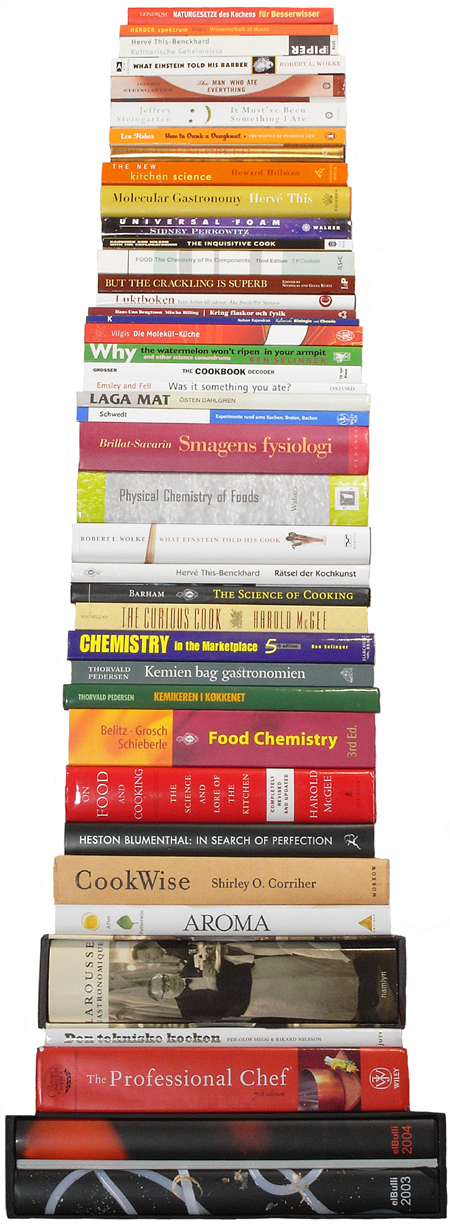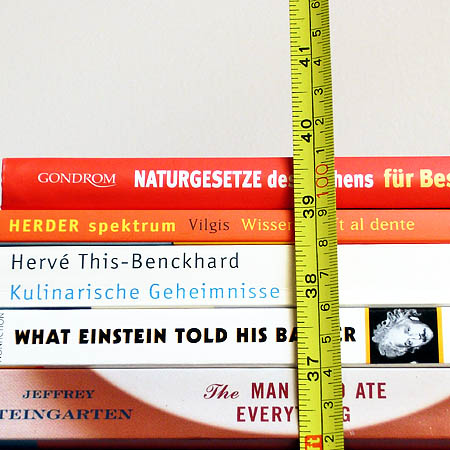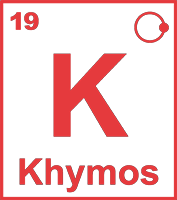
Click here for full size image
7. Question authorities and learn from the experts
A thick, nicely bound cookbook with marvelous pictures and a professional layout signals quality and authority. But unfortunately the nice wrapping is no guarantee that the contents is scientifically sound. I would guess that the searing/sealing myth and adding salt to water used to boil vegetables are among the most ubiquitous of the myths. The challenge for everyone is to question the procedures and explanations given in cook books and those that are inherited from your parents and grandparents. Most of them are fine, but some are not. In fact Hervé This has collected more than 20.000 so called “precisions” from French culinary books that he wants to test.
My seventh tip for pursuing molecular gastronomy in your very own kitchen is to question the cook book authorities, but also to learn from the experts in the field. The site Khymos originally started out as a listing of books and web pages that could be useful for anyone interested in molecular gastronomy and popular food science. When giving presentations it was more convenient for me to refer to a webpage than to have people taking notes of all the references. My own collection of books is constantly growing as you can see from the picture (I justed crossed the 100 cm mark), and I am more than happy to share with you my favorite books. Most of what I know about food chemistry and molecular gastronomy is from these books.

Molecular gastronomy should of course never become a theoretical practice only, so remember that “the proof is in the pudding”, as Nicholas Kurti, one of the pioneers of molecular gastronomy often said. Let taste guide your cooking and learn how to conduct simple blind tastings (more on that in part 8). If possible, do an experiment: if there are two or more procedures, follow them and compare the end result.
Despite the many books and articles that have appeared on food chemistry and molecular gastronomy there are still many questions that remain unanswered. Scientifically, molecular gastronomy is tremendously complex. The science of deliciousness lies in the cross section of analytical, biological, inorganic, organic, physical, polymer and surface chemistry. But even though describing and understanding what happens is difficult, everyone is able to judge the end result! This is quite intriguing and because of this it is possible to become an excellent cook – even if you don’t understand the chemistry behind in every detail. This makes me confident that there will always be an “art” and a “love” component in cooking, as Hervé This puts it in his definition of molecular gastronomy.
*
Check out my previous blogpost for an overview of the 10 tips for practical molecular gastronomy series. The collection of books (favorite, molecular gastronomy, aroma/taste, reference/technique, food chemistry, presentation/photography) and links (webresources, people/chefs/blogs, institutions, articles, audio/video) at khymos.org might also be of interest.

Thank you so much for posting this. It’s one of the things that we always preach to young cooks who want to be chefs… read, read, read!
It’s true that a chef is not a scientist, but it doesn’t relieve him of the responsibililty of what is happening to the food on every level while he prepares it. The sculptor does not necessarily know the chemical properties of the clay, but he should be very in tune with the physical properties. This requires attention and reverence.
I’ve seen it happen so many times how an inexperienced cook will not be focused on the sights, aromas, sounds, and sensations around him. It’s not just about taste. Many times I’ve walked onto someone’s station and immediately felt that the oven wasn’t hot enough, or the grill is burning to hot on one side, or that roast garlic in the bottom oven is ready from the aroma it’s giving out. Pay attention! I do not know all of the reasons why the food around me reacts as it does, but I am aware of the reaction.
Your website is definitely suggested reading for our cooks. We all need to study more about what we love.
Cool message.
I hope you’ll surf on my diary..
Thank You Again
gret post, and now I have a new walpaper…
hank you!
[…] outside the cook book! I mentioned in previous post that you should always question authorities and cook books. And even when you have a recipe that works, remember that it’s nothing more than a […]
So, all these books in your pot is good for reading? I saw el Bulli so, what is more “why putting salt in water when cooking vegtables” and what is more like “melon spheres”?
With questions like “why (NOT) putting salt in water when cooking vegetables” I would recommend books listed on https://khymos.org/books_mg.php, especially those termed as “popular science books about food”.
Regarding melon spheres and use of hydrocolloids you might be interested in starting with “Texture – A hydrocolloid recipe collection” which is available for free download from https://khymos.org/recipe-collection.php.
Nice! Thank’s man. It’s a jungle of those books and, you have to know what’s good and not.